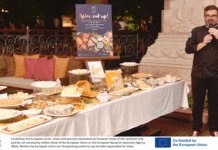
Union Minister of state for health and family welfare Prataprao Ganpatrao Jadhav has inaugurated a National Stakeholder Consultation on ‘Sustainable Packaging for Food Business: Emerging Global Trends and Regulatory Framework’ organized by the Food Safety and Standards Authority of India (FSSAI) in Mumbai on 16 April 2025.
Jadhav highlighted the growing importance of the sustainable packaging of food items. He announced that the guidelines for the use of rPET in packaging have been prepared by FSSAI after extensive consultations with all stakeholders and in line with the best global practices. He mentioned that a logo has been developed for easy identification and to benefit consumers of food products.
Jadhav said the “shift towards sustainable methods of packaging is the need of the hour.” He said the usage of plastic is a growing concern globally, as it stays undecomposed in the environment for years, having detrimental consequences. “What we need today is a shift towards alternatives that are sustainable, recyclable, and biodegradable,” he stated.
Hailing India’s age-old traditional methods, Jadhav emphasized the need to connect the ancient ecological practices to modern techniques to ensure sustainability stating that “India has the potential to lead the world in this direction.”
He appreciated the efforts of the ministry of health and family welfare and FSSAI for providing an important platform in the form of the National Stakeholders Consultation to deliberate on crucial issues that affect the health and well-being of the country.
The minister held an informal open consultation session with stakeholders, providing them an opportunity to share their challenges and discuss future avenues for improvement and growth. The consultation brought together over 1,500 stakeholders representing food businesses, packaging industries, recycling associations, regulatory bodies, environmental organizations, consumer groups, farmer groups, and government departments to deliberate on the future of sustainable food packaging in India.
The consultation was part of an ongoing series of national-level stakeholder discussions aimed at holding critical deliberations on critical issues that require multi-stakeholder engagement. Under the aegis of the Ministry, FSSAI has launched this pivotal initiative to convene such National Stakeholder Consultations to foster greater inclusivity, transparency, and evidence-based policymaking in the formulation of food safety regulations.
By actively engaging with industry, academia, consumer groups, farmer groups and regulatory bodies, FSSAI seeks to incorporate sector-specific perspectives and ground-level insights into its regulatory framework, ensuring that policies are both practical and aligned with public health priorities.
The consultation featured a Technical Session wherein the chairperson of FSSAI’s Scientific Panel on Packaging presented on the detailed scientific basis, risk assessment principles, and transparent consultative approach employed by FSSAI while framing robust scientific standards.
Representatives from BIS talked about the Global and Indian standards on food packaging and the overview of the existing IS standards for packaging materials. The Central Pollution Control Board (CPCB) shared about the role that CPCB plays in driving sustainable practices through Extended Producer Responsibility (EPR) under the Plastic Waste Management Rules.
Representatives from the industry presented innovative approaches being adopted to develop eco-friendly, lightweight, and recyclable packaging solutions tailored for food and beverage products, the importance of plastic waste recovery and recycling to support the circular economy and consumer concerns and expectations towards sustainable food packaging.
The session concluded with a technical debrief by Alka Rao, advisor (Science & Standards and Regulations), wherein she emphasized the importance of stakeholder collaboration in advancing sustainable packaging solutions that align with food safety standards and support India’s broader environmental goals.
IndiFoodBev — authentic, impactful and influential
An English-language food and beverage processing and packaging industry B2B platform in print and web, IndiFoodBev is in its third year of publication. It is said that the Indian food and beverage industries represent approximately US$ 900 billion in revenues which implies more than 20% of the country’s GDP. Eliminating the wastage on the farmside can help to deliver more protein to a higher number of the population apart from generating sizable exports. The savings in soil, seeds, water, fertilizer, energy and ultimately food and nutrition could be the most immense contribution that country is poised to make to the moderation of climate change.
To improve your marketing and grow sales to the food and beverage processing and packaging industry, talk to us. Our research and consulting company IppStar [www.ippstar.org] can assess your potential and addressable markets in light of the competition. We can discuss marketing, communication, and sales strategies for market entry and growth.
Suppliers and service providers with a strategy and budget for targeted marketing can discuss using our hybrid print, web, video, and social media channels to create brand recognition linked to market relevance. Our technical writers are ready to meet you and your customers for content.
The second largest producer of fruit and vegetables in the world is continuously expanding processing capacities and delivery systems with appropriate innovative technologies. We cover product and consumer trends, nutrition, processing, research, equipment and packaging from farm to thali. Get our 2025 media kit and recalibrate your role in this dynamic market. Enhance your visibility and relevance to existing markets and turn potential customers into conversations. Ask for a sample copy of our bi-monthly in print or our weekly IndiFoodBev eZine each Wednesday.
For editorial info@ippgroup.in — for advertisement ads1@ippgroup.in and for subscriptions subscription@ippgroup.in
Naresh Khanna – 10 February 2025
Subscribe Now










